Many people have trouble choosing between over-the-counter sleep aids because doing so requires an in-depth understanding of the ingredients contained in these products. My goal in writing this article is to arm you with the knowledge required to understand the real differences between some of the most common over-the-counter sleep aids.
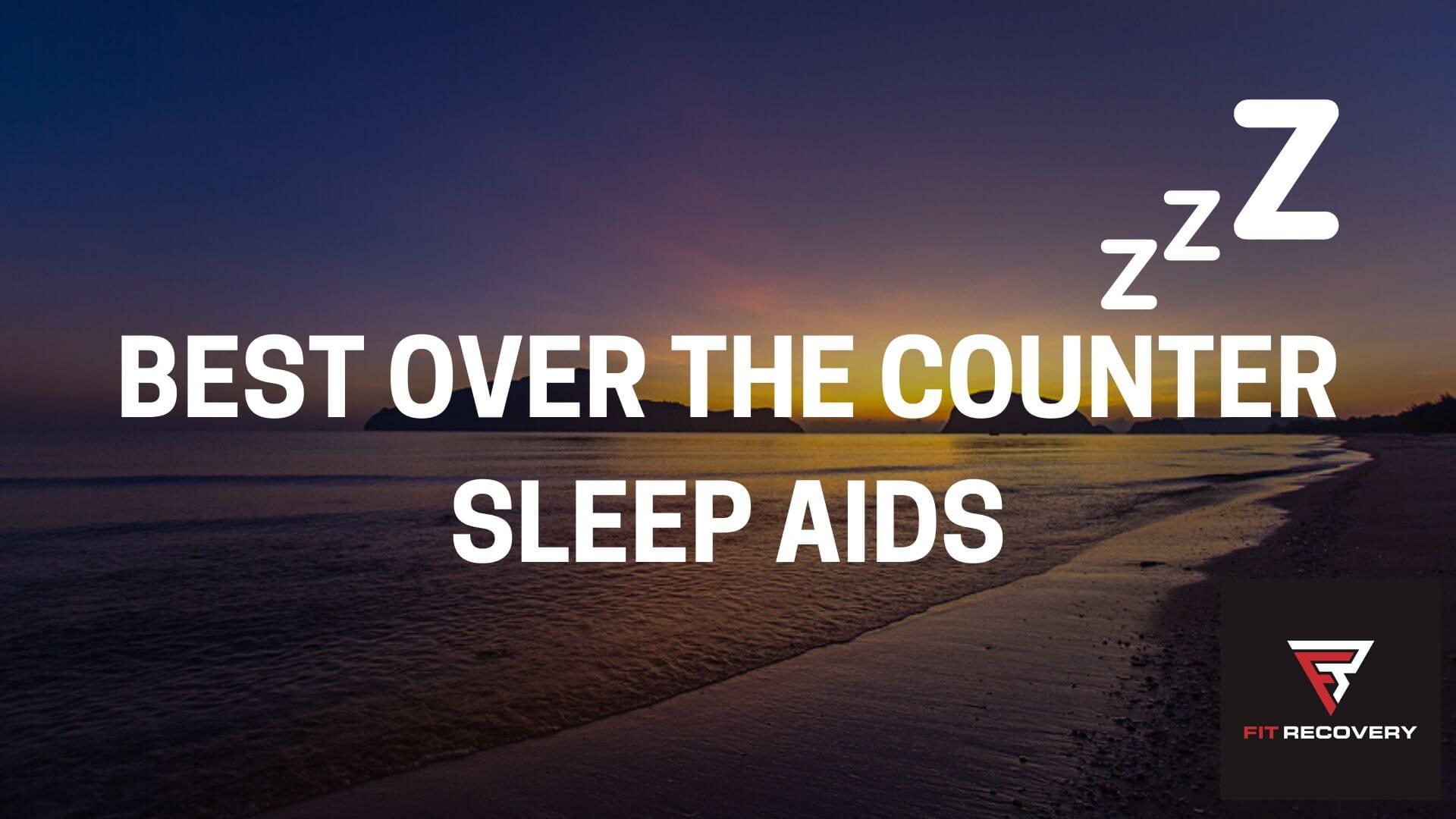
After that, I will tell you about some lesser-known products that actually work better than the common ones you see in stores. But why should you trust me on this subject?
Until relatively recently, I suffered from insomnia for my entire life. There’s nothing worse than laying hopelessly in your bed, turning over for the 15th time, and then reluctantly glaring at your alarm clock to discover what you already know: that as of right now, you can only get two hours of shuteye at best.
After I quit drinking, my insomnia was often unbearable. And so I became a verifiable aficionado of sleep aids!
Before turning to sleeping pills to resolve your insomnia, it’s important to fix elements of your lifestyle that could be contributing to this heinous problem:
- Poor stress management
- Poor diet
- Lack of exercise
- Excessive caffeine consumption (especially after noon)
- Bad sleep hygiene
- Dependence on alcohol and/or drugs
When I notice that a particular sleep aid works for my private coaching clients, many of whom suffer from difficulty resting, then I know it must be super effective!
Sleep aids are sometimes necessary, but diet and lifestyle should be the first lines of attack. Since 2014, I’ve definitely slept better since I started taking supplements that ensure my nutritional bases are covered.
Why Does Alcohol Recovery Include Insomnia?
Although some people find that drinking alcohol helps them to fall asleep, it actually damages sleep cycles by interrupting your circadian rhythm. This has a lasting effect on the quality of rest over time.
It’s not uncommon, then that when you quit drinking your body will try to return to a normal sleep cycle, but this process takes time.
In addition to sleep aids, you can try a few of these remedies if you quit drinking and can’t sleep.
We will now discuss how the most common sleep aids work, how their ingredients vary, and which ones work the best.
Overview
Most OTC sleep aids contain one or more of the following active ingredients:
- Doxylamine succinate
- Diphenhydramine hydrochloride
- Melatonin
- Vitamins and minerals
- Amino Acids
- Herbs
The first two items on the list above are antihistamines with short-term sedative properties. Products containing doxylamine succinate include Kirkland Signature Sleep Aid, Unisom SleepTabs, and Wal-Som. Diphenhydramine hydrochloride is the active ingredient in Unisom SleepGels, Benadryl, and Zzzquil.
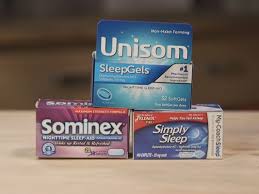
Antihistamines do help people fall asleep and are non-habit-forming. However, they can cause undesirable side effects like next-day grogginess, which I experienced whenever I sampled these products. For some people, these antihistamines can also cause a loss of libido.
Melatonin is a hormone produced by the pineal gland that controls sleep cycles. Many OTC sleep aids now contain melatonin, often in doses ranging from 2mg to 10mg. These amounts are too much, as melatonin has shown to be effective at a dosage of only 0.3mg!!
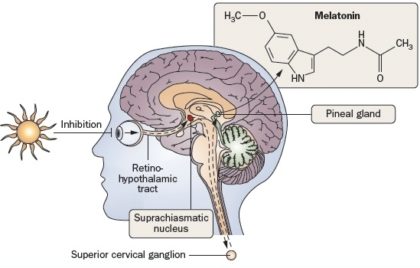
Taking the melatonin doses contained in mainstream supplements can cause next-day grogginess, dizziness, irritability, and even depression! As it turns out, the scientist who first synthesized melatonin claims he has “no idea” why supplement companies have decided to mega-dose this ingredient. (source)
As for vitamins and minerals, some B vitamins and minerals like magnesium can really help facilitate slumber. Restoring your own nutritional deficiencies will balance your brain, leading to better overall health and rest.
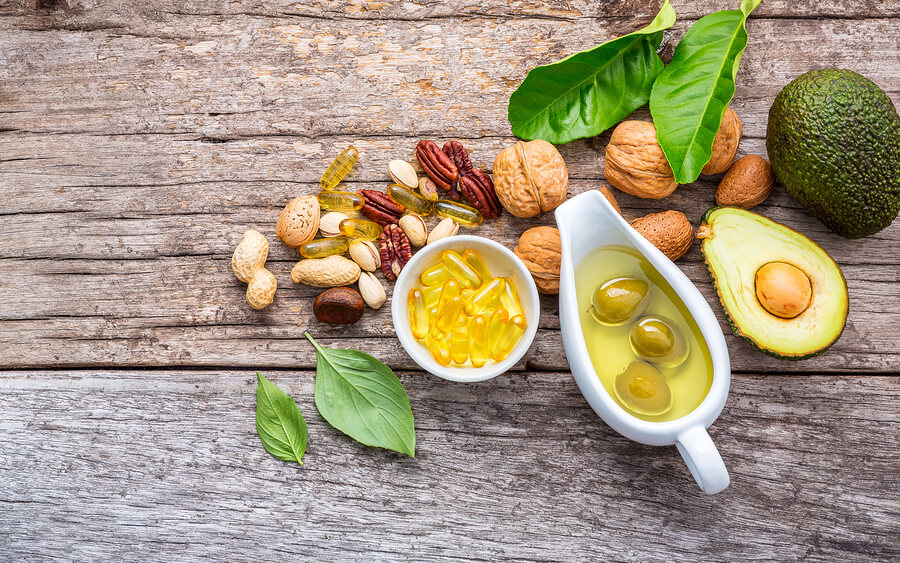
After I quit drinking and struggled with insomnia, magnesium was the first “miracle cure” that I discovered for insomnia, anxiety, and restlessness. This makes sense, since alcohol severely depletes magnesium levels.
Amino acids are important because they serve as natural building blocks for neurotransmitters that help induce rest. In particular, L-Tryptophan and 5HTP (a derivative of L-Tryptophan) are precursors to serotonin, a neurotransmitter required for confidence, relaxation, and contentedness. Serotonin itself is converted into melatonin in the brain.
L-Theanine, the primary calming compound in green tea, is an amino acid that inhibits a stress chemical called glutamate. Incidentally, alcoholics going through withdrawal suffer in large part because of surging levels of glutamate and very low levels of GABA.
GABA is the brain’s primary calming neurotransmitter. Many sleep aids contain GABA in amino acid form. However, GABA taken in this form has not been shown to cross the blood-brain barrier.
Herbs that help with sleep tend to gently stimulate GABA receptors or inhibit stress chemicals. Passionflower, valerian, and hops have been shown to increase levels of GABA in the brain. Ashwagandha is an adaptogen that regulates hormones that are vital for rest.
In my opinion, the perfect sleep supplement would satisfy the following conditions:
- Avoid antihistamines
- Contain a very small yet effective dosage of melatonin
- Contain herbs that naturally boost GABA
- Integrate amino acids and herbs that have been proven to help with sleep
OTC Sleep Aids Reviews – My Top 7 List
I want to share with you my Top 7 favorite over-the-counter sleep aids.
I have rated them according to three criteria:
- How QUICKLY I was able to fall asleep after taking them
- How DEEPLY I slept after taking them
- How RESTED I felt the following morning upon waking up
I’ve tried everything from Benadryl to ZzzQuill to herbal blends on Amazon. The vast majority of these products did not make the cut.
So, here is my list:
1) Sleep Support
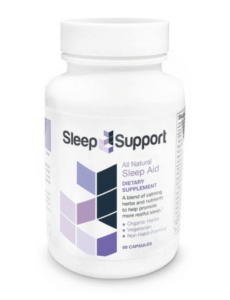
Sleep Support is my favorite supplement for slumber by a long shot. If I had to invent a sleep aid, it would be this one. I will explain why in the sections below, which will further explore this fascinating supplement.
In short, Sleep Support contains a well-designed combination of herbs, amino acids, and sleep-promoting compounds that can help you to restore your mental health from the inside out. Passionflower, ashwagandha, and L-tryptophan are just a few of the ingredients in this impressive supplement. More importantly, I can attest to the fact that it works VERY quickly – and causes the exact opposite of drowsiness upon waking up.
Rating: 9.5/10
2) Top Extracts 70% Kavalactones Powder
For pure effectiveness, nothing works better for me than kava. You can find weaker kava extracts in stores like Whole Foods. However, the kava powder from Top Extracts is much more potent, while still being nonaddictive. 1/2 teaspoon of the Top Extracts 70% Kavalactones Powder mixed into a glass of spring water will usher in pure bliss and a great night’s sleep.
I recognize that not everyone wants to mix an herbal powder into a glass of water before bed. The good news is that it has virtually no taste, unlike other kava brands I have tried.
Rating: 9/10
3) NatureWise 5HTP
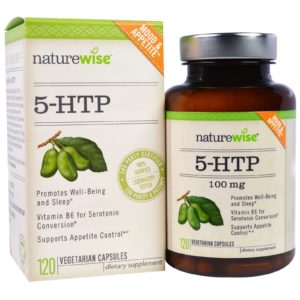
The amino acids 5HTP and L-Tryptophan are very similar compounds that both serve as natural building blocks for serotonin. Increasing serotonin levels also increases melatonin levels in your brain. Everyone is different biochemically, but when isolating either 5HTP or L-Tryptophan as standalone supplements, I have had the best results with this brand.
Rating: 8.5/10
4) Solaray Passionflower
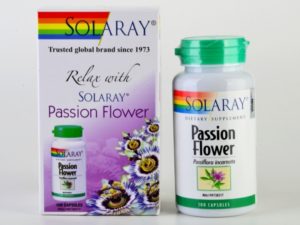
This powerfully relaxing herb has been shown to naturally increase GABA levels, which might be thought of as our brain’s natural Valium. I adore passionflower as a standalone supplement. When I’m having racing thoughts, one capsule of this brand will put me to sleep in about 20 minutes.
Rating: 8.5/10
5) Natural Factors Tranquil Sleep
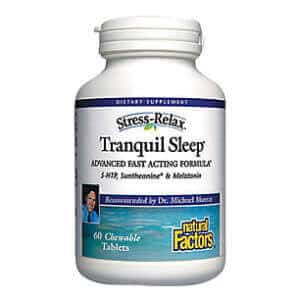
This supplement has been around for several years, and I actually used it to begin some “dry periods” before I quit drinking for good. It contains L-Theanine, 5HTP, and melatonin. It works extremely well to bring on rest, but my main criticism is that it definitely contains too much melatonin (3 mg) for long-term use.
Rating: 8/10
6) Suntheanine (L-Theanine)
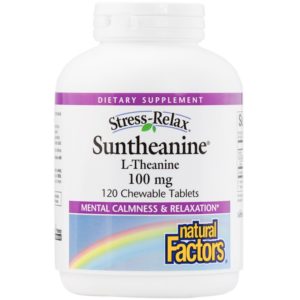
This amino acid blocks the stress chemical glutamate, producing a significant relaxing effect that can help to bring on slumber. I have had great results combining l-theanine with passionflower, as these ingredients seem to work synergistically.
Rating: 8/10
7) Ashwagandha
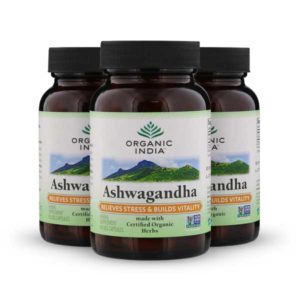
This is my current go-to herb for restlessness and insomnia. It might not put you to sleep as quickly as some of the other supplements on this list, but it works by protecting your adrenals and thyroid from the deleterious effects of stress. In contrast to sleep aids that simply knock you out, ashwagandha addresses the root causes of many cases of insomnia.
I honestly believe that adaptogens like ashwagandha are the next frontier for supplementation. Ayurvedic medicine has used this herb for centuries, and modern science has finally begun to explain why it often works.
Rating: 8/10
The only reason I did not include magnesium citrate in the list above is that it will only enhance sleep for people who are deficient in magnesium. If you hate leafy greens and happen to be a former alcoholic or heavy drinker, I highly recommend giving magnesium a try before turning to over the counter sleep aids.
My favorite brand of magnesium is Thorne Research Magnesium Citrate.
Honestly, I’m often torn between single-ingredient supplements and well-designed blends that cover many bases. I like single-ingredient supplements because they allow you to identify what exactly is helping with your sleep. At the same time, a blend like Sleep Support will almost certainly be the most effective solution.
Here are some other natural “honorable mentions” that I have found to help with sleep:
- Chamomile Tea – 6 bags steeped in a pitcher before bed helped me sleep for many months
- Lemon balm – This is the most gentle supplement I have found with sleep, but a LOT is required (3-4 herbal powder capsules) to feel any effect, and most blends that use lemon balm do not contain enough to be effective
- Clary Sage Oil – I have found that rubbing a drop or two of this oil on my palms, and slowly inhaling the scent, helps with sleep and doing so has been shown to combat insomnia
At the end of the day, I want you to be able to order something that puts you into a deep sleep as soon as possible, and a high quality blend like Sleep Support is most likely to accomplish that.
Sleep Support Review

Now I will explain why Calm Support’s Sleep Support made it to the top of my list above.
When I recommended Sleep Support to a client of mine who had previously used Xanax and Ambien for sleep, she was extremely pleased. It was the first non-prescription sleep aid she’d tried that had ever worked.
She had tried sleep supplements with limited success, but here was something that worked just as well as powerful prescription drugs – with no side effects to speak of.
Based on my own experience with Sleep Support, I knew that most people would experience great results. But I really didn’t know if this particular client, who was used to VERY strong prescription drugs, would actually feel anything from it.
Sleep Support is made by a company called Calm Support, which also makes a product called Calm Support that is helpful for people who want to quit or cut down on drinking.
I’m a big fan of this company because its message is similar to mine: that mental health issues are not just symptoms that should be made to disappear artificially, but rather clues to underlying deficiencies that should be restored by providing the natural building blocks for vitality.
Anyway, Sleep Support is superior to other over the counter sleep aids for six specific reasons:
- It doesn’t contain antihistamines with undesirable side effects
- It doesn’t contain an unnecessarily high dose of melatonin – just enough to induce sleep
- It contains highly bioavailable magnesium, which is a miracle mineral for sleep
- It contains L-Theanine and L-Tryptophan, two amino acids clinically proven to help with sleep
- It contains five organic herbs, all of which are clinically proven to help with sleep
Sleep Support was formulated with the help of a doctor who understands that less is more when it comes to melatonin. This compound can be very helpful, but too much is not a good thing. It does not contain enough melatonin to overwhelm your natural cycle.
Here is the full list of the ingredients contained in Sleep Support:
- Magnesium Citrate – Counteracts insomnia by calming the entire nervous system
- Melatonin – Primary hormone used by our bodies to induce sleep
- L-Theanine – Encourages sleep by lowering glutamate and cortisol levels
- L-Tryptophan – Naturally increases levels of serotonin and melatonin
- Passionflower – Clinically shown to increase levels of GABA, the brain’s calming chemical
- Valerian – Promotes sleep by enhancing GABA activity
- Hops – Encourages sleep by calming brain activity and inducing relaxation
- Ashwagandha – Improves sleep by modulating GABA and balancing the thyroid
- Wild Lettuce Leaf – Supports sleep via pain-relieving and anti-anxiety compounds
Sleep Support contains magnesium citrate, which is the most bioavailable magnesium available. Don’t waste your money on supplements that contain magnesium oxide – virtually none of it will be absorbed into your bloodstream! It’s not harmful; it’s just a waste of money.
Sleep Support contains enough magnesium to help you sleep better. However, it was not primarily devised to repair a serious magnesium deficiency. If you’re deficient in this mineral, simply take extra magnesium citrate. I used up to 400 mg of magnesium per day when I was repairing my body from years of heavy drinking, which significantly depletes this mineral.
Passionflower is by far my favorite herb for relaxation and sleep. I used to keep a bag of organic passionflower powder (the herbal powders in Sleep Support are also organic). When I took a small spoonful, I felt as if I’d been enveloped by a soothing, sleepy cloud. Valerian and wild lettuce leaf have similar properties as passionflower.
Hops is an herb with sedative properties that I once underestimated. A few months ago, I bought my dad a Dr. Brew kombucha drink called Citrus Hops, and my mom found him uncharacteristically passed out on the couch about an hour later. Extra hoppy beers can have the same effect, but alcohol is toxic for your sleep – it will make you wake up in the middle of the night – but hops is an amazing herb for ensuring a deep slumber.
As I mentioned above, I still take ashwagandha when I feel stressed out. This Indian herb selectively restores balance to your hormonal system and is a potent natural antidepressant.
Combine all of the above with serotonin-supporting L-tryptophan, stress-canceling L-theanine, and the minimum effective dosage of melatonin, and you end up with the most powerful non-prescription sleep aid available.
Where Can I Buy Sleep Support?
As of now, Sleep Support can only be bought from the Calm Support website.
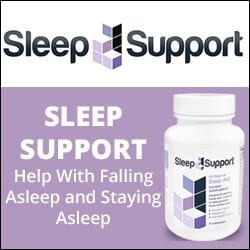
Over the past year, I’ve become a huge fan of Calm Support products. In an industry saturated with scammy supplements, their commitment to quality and customer service is unmatched. Their CEO, Ryan Donnelly, has personally helped individuals who are battling opiate addiction. His objective is to help as many people as possible over the long-term.
Shipping for Sleep Support is free, and there are discounts on multiple-bottle purchases.
If you don’t like Sleep Support for any reason, you can return it for a full refund.
Directions: Take 1 to 2 capsules 30 minutes before bed to help improve sleep. Each bottle contains 60 capsules.
Pricing: 1 bottle for $29. 2 bottles for $46 (20% discount). 3 bottles for $63 (25% discount). 4 bottles for $80 (30% discount).
Scientific Research

Research shows that the ingredients in Sleep Support can help to combat insomnia:
- People who took 5HTP went to sleep quicker and slept more deeply than those who took a placebo (source)
- Magnesium supplementation improves both subjective and objective measures of sleep in the elderly (source)
- Five out of six high quality studies showed that melatonin supplementation aids with sleep (source), but mainstream supplements that contain 3 mg or more are giving people ten times the effective minimum dosage (source)
- L-theanine is safe and effective for improving insomnia outcomes (source)
- 40 controlled studies have found L-Tryptophan to be effective for insomnia, with best results for people with sleep disorders and few noticeable effects for “normal” sleepers (source)
- A double-blind, placebo-controlled study found that passionflower significantly outperformed a placebo in improving sleep quality for volunteers (source)
- Ashwagandha was found to significantly reduce serum levels of cortisol, a stress hormone, whose elevated levels are often implicated in some sleep disorders (source)
- A systematic review and meta-analysis of the use of valerian root for sleep disorders found that valerian improves sleep quality (source)
- Ingestion of hops produces a statistically significant reduction in nocturnal activity and improvement in circadian rhythm (source)
- Small amounts of wild lettuce are safe and effective for restlessness and insomnia (source)
Conclusion
I share a lot of nutritional and lifestyle strategies on this site for transcending toxic behaviors and optimizing your body.
At the end of the day (literally), none of it matters if you don’t get consistent rest!
When you sleep, your body repairs its cells. It also regenerates the hormones and neurotransmitters that you need to be healthy and feel happy. Insomnia isn’t something to play around with, especially when it lasts more than a day or two.
I hope this article has helped you. If you want to read about more strategies to deal with insomnia during alcohol withdrawal, then my article on that subject might be a lifesaver for you.
If you have any questions, feel free to post them in the comment box below.







Can you take calm support and sleep support every day?
Hi Joanne, I have had coaching clients who like to take Calm Support in the morning and Sleep Support at night. Most people only need to use these supplements daily for 1-3 months. After that, they can use them as-needed, which is what I now do. Sleep Support is really awesome for occasional insomnia! If you take an SSRI, avoid these supplements – and make sure to talk to your doctor before taking any supplements. Good luck to you!